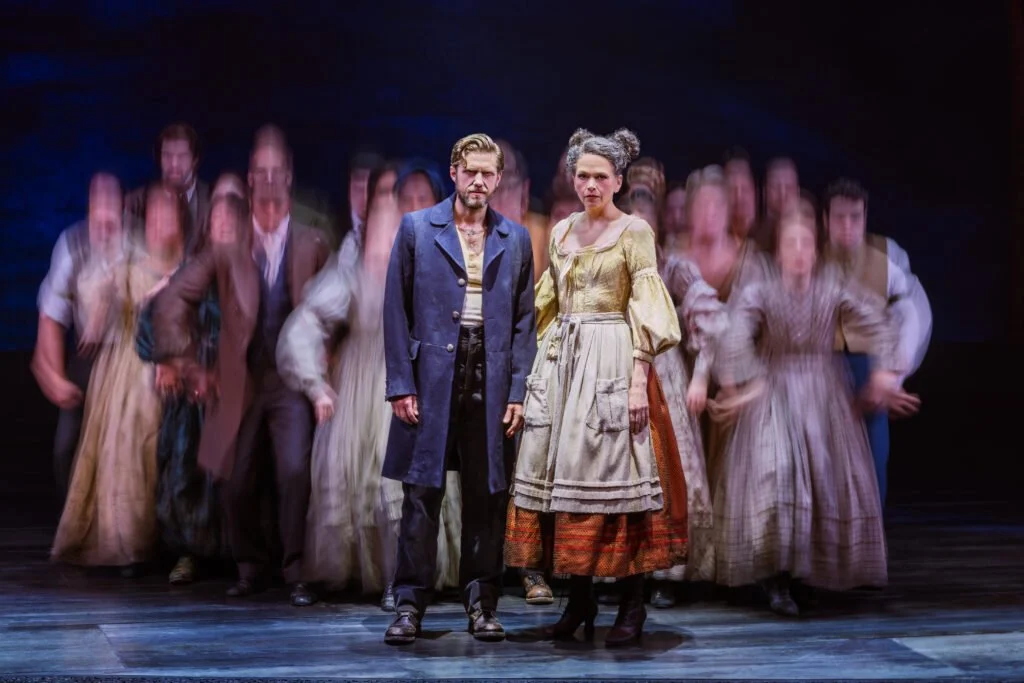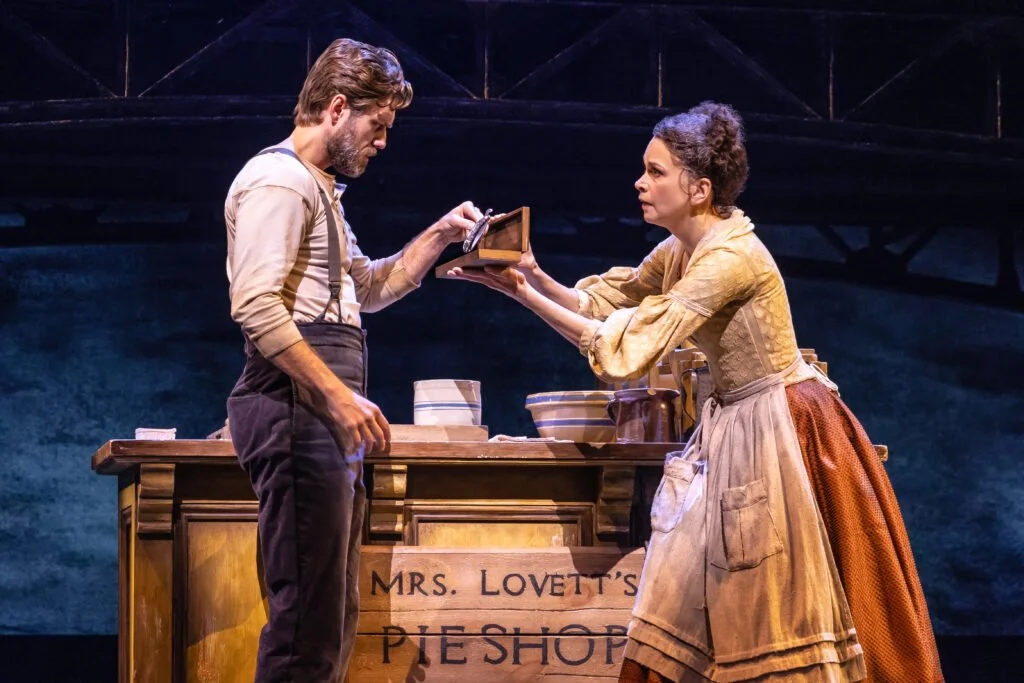How Aaron Tveit Made the Cut for ‘Sweeney Todd’
A tenor known for romantic leads, the actor-singer tackles the iconic demon barber with only a slight key change and an emphasis on the humanity as much as the horror.
Aaron Tveit and Sutton Foster in “Sweeney Todd.” (Photo by Matthew Murphy and Evan Zimmerman)
Originally published in American Theatre
View this story online
When Stephen Sondheim began writing Sweeney Todd, his stated goal was to “scare the hell out of the audience.” The composer could might have added “and the cast.”
The legendary composer’s adaptation, with playwright Hugh Wheeler, of Christopher Bond’s 1970 play about a murderous barber is known for the complexity of its score as much as its macabre subject matter. Following the release the original cast album’s release, The New York Times wrote of the score, “There are those who think this the most progressive musical of recent years, and perhaps the closest we’ve yet come to a genuine popular American opera.” The demon barber of Fleet Street, in short, is not a role any actor takes on lightly.
“People say, do things that scare you,” said Aaron Tveit, now starring as the titular barber in the current revival at Broadway’s Lunt-Fontanne Theater (in a limited run through May 5). “I was definitely scared about this role.”
The announcement last fall that Tveit and Sutton Foster would be take up residence on Fleet Street as Sweeney Todd and Mrs. Lovett, respectively, surprised theatre fans hankering for a shave. Neither of the Tony-winning actors, replacing Josh Groban and Annaleigh Ashford in Thomas Kail’s acclaimed revival, are known for playing dark or villainous characters. What’s more, the role of Sweeney is traditionally played by a baritone; Tveit is a tenor. Josh Groban is only the most recent Broadway Sweeney in that mold: The original 1979 production starred Len Cariou, chosen for the role by Sondheim himself, before George Hearn stepped in. The 1989 revival starred Bob Gunton, and Michael Cerveris played Sweeney in John Doyle’s 2005 production.
Tveit, who made his Broadway debut as the heartthrob Link Larkin in Hairspray, has romanced costars onstage in Wicked, Catch Me If You Can, and Moulin Rouge! The Musical, and appeared onscreen in Les Misérables and Schmigadoon. You could argue that his role as a ghostly teen in Next to Normal gave him thorny material to tackle, but it’s not just the character of Sweeney but the music, rendered in the new revival with Jonathan Tunick’s original 26-piece orchestrations, that marks a drastic departure from Tveit’s previous work.
Aaron Tveit and Sutton Foster in “Sweeney Todd.” (Photo by Matthew Murphy and Evan Zimmerman)
Tveit’s performance in Grease Live!, also directed by Kail, is what inspired the director to cast him in Sweeney Todd. Kail was struck by the intensity and focus Tveit brought to the role of Danny Zuko, as well as his ability to take ownership of a well-known character with a devoted fan base.
“That is actually a very similar and necessary skill when you’re stepping in to play Sweeney,” Kail said. “It felt like he’d be a great partner in this particular endeavor.”
Sweeney Todd offers something of a return to Tveit’s musical roots, as he studied violin as a child and majored in classical voice in college before he began a career of singing “lots of screaming high rock songs.” (Videos dedicated to him optioning up in “El Tango de Roxanne” flood YouTube and TikTok.) Such soaring melodies are a sharp contrast to the ominous orchestrations of Sweeney Todd. But very little of the score has been adjusted for Tveit. What excited Kail, he said, was a chance to explore a new interpretation of the musical.
“I believe the opportunity that revivals provide is a chance for interpretation and reinterpretation,” Kail said. “So I felt that there was something about everything that Aaron was bringing to this that was going to allow us to express and explore.” Working with music supervisor Alex Lacamoire, Kail said they “felt like we were able to find something that was honest and true to Aaron’s expression of it.”
“The music is so intricate, so specific,” Tveit said. “It’s a wonderful challenge for me to tap into this part of my voice.” To be specific: “We tweaked a little bit of a key in ‘Epiphany’; we raised that half a step, but everything else is as it is.”
Described by Sondheim as a “schizophrenic breakdown,” the song “Epiphany” marks Sweeney’s conversion from an obsessed, heartbroken man into a cold-blooded serial killer, as the music shifts from measured declarations of humanity’s downfall to erratic invitations for audience members to enjoy a shave.
This is hardly Tveit’s first encounter with Sondheim’s challenging, complex, and unconventional music, with its frequent exploration of characters’ (often misguided) search for fulfillment. Before Sweeney, Tveit played the commitment-phobic Bobby in Company at Barrington Stage and the murderous John Wilkes Booth in Assassins at London’s Menier Chocolate Factory.
Tveit said he developed a unique approach to Sweeney’s story as he explored the character. In his eyes, a wronged man returning home to seek vengeance and a reunion with his scattered family was analogous to a superhero revenge backstory. That said, it was important for Tveit to begin Sweeney’s story from a place of humanity, he said, rather than murderous intent.
“His humanity is hanging on by a thread,” Tveit said of Sweeney’s first scenes in the show. “And throughout the course of the play, when he learns what has happened to his family—these are all the things that start to pile up. All of the trauma, the PTSD that he’s been through in the past 15-plus years, starts to take over, and his humanity truly unravels.”
Aaron Tveit and Sutton Foster in “Sweeney Todd.” (Photo by Matthew Murphy and Evan Zimmerman)
Kail praised what he called Tveit’s “terrific amount of compression in those first 15 minutes” of the show. “Sweeney finds out in one conversation after ‘Worst Pies’ that everything he thought about for the last 15 years has been dissolved. Now who is he going to be? Then, with the offering of the razors, this other seed is planted. Aaron was really trying to navigate those hairpin turns and also make sure that there was emotional underpinning.”
It’s in that unraveling, though, that Tveit’s Sweeney finds his strength. By the end of the first act and the shattering “Epiphany,” said Tveit, “He’s totally in his power. It just happens that that power is, ‘I don’t care.’ I’m hoping that the audience can imagine themselves in that circumstance and maybe making the same choices.”
This ability to relate to Sweeney is what enables Tveit to imagine his way into Sweeney’s bloody path. He mentioned Jeffrey Dahmer and Ted Bundy, and the surprise people who knew them felt when their horrific crimes were revealed. Tveit tapped into these instincts during his scenes with Judge Turpin, adopting a lower-class London accent when conversing with the high-born man who ruined his life.
“These upper-class, arrogant high station people in London at this time would never look twice at a lower-class barber by talking to them,” he said. “So I leaned into those moments as like camouflage, hiding in plain sight.”
This strategic, Machiavellian approach is put to use by many criminals, especially serial killers, Tveit said.
“I think a lot of serial killers are people that you maybe wouldn’t look twice at, or ever think in a million years that they’d be the one doing it,” he said. “If that’s the perception that people think of me, I actually think that can work in my favor, because of how you’re trained to watch shows.” Referring to his co-star, Sutton Foster, known for capering comedies, “We might be the last people for people to think we’ll be doing this. I think that that’s something like the snake in the grass.”
Said Kail, “We talked a lot about light and shadow, what you see and what you don’t see, and what’s right in front of you. How many times in the show does someone say, ‘Your face is familiar to me’? He walks into a crowd, and yet no one recognizes him. What do we see? What do we want to see? What are the things that are obscured, and why are they obscured?”
It’s safe to say the theatre community did not see Tveit coming for this role. The notion of a seemingly younger, tenor-voiced Sweeney had the potential—or danger—of shifting the show in a new direction. (For the record, Tveit is the same age, 40, that Len Cariou was when he originated the role in 1979.) While Tveit credits the creative team with giving him and Foster the freedom to bring a new take to their characters, he also credits the strength of the text itself.
“They let Sutton and I come in and do something very different, but the production still is the same production,” he said. “I really think that’s because of how brilliant the writing is. The writing can really hold up to that, and hold up anything.”
Indeed, Tveit said, the brilliance and durability of Sondheim’s has only grown more apparent in the years since he died.
“I like to think 100 years from now, or 200 years from now, people are going to be looking back at the shows the way we look at Shakespeare and classic plays,” Tveit said. “You think about Shakespeare, how throughout the years, all these actors come in and they take their big swing at it. The material is so good that it holds up to big choices.”



